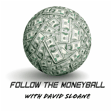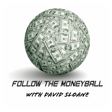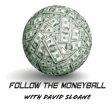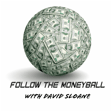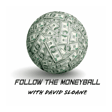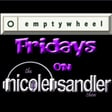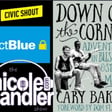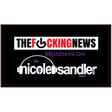Become a Creator today!Start creating today - Share your story with the world!
Start for free
00:00:00
00:00:01

Follow the Moneyball Episode #11
David has a fascinating interview with Brandon Steiner of Collectible Xchange, the man who revolutionized memorabilia/collectibles business. and a font of business knowledge.
Transcript
Introduction and Guest Welcome
00:00:02
Speaker
Welcome to Follow the Money Ball, a podcast at the intersection of sports and business. Here's your host, David Sloan. I'm David Sloan, and I have opinions. I also have 44 years of experience as an agent for MLB players to back those opinions up.
What is X Collectible Exchange?
00:00:18
Speaker
My guest today is Brandon Steiner. You probably know him from Steiner Sports and his new company, X Collectible Exchange. Welcome, Brandon. Thank you for joining us today.
00:00:30
Speaker
I love that introduction. Thank you. Most people know, you know, Steiner, Steiner Sports. It's so weird to even say it, but now it's collectible exchange, which is like a form of eBay we can buy and sell. I'm trying to resell all the stuff that I sold the first time.
00:00:45
Speaker
I'm trying to resell it a second time. And then I could be in the salesperson's Hall of
The Excitement of the Sports Season
00:00:50
Speaker
Fame. But thanks for having me. It's a beautiful weekend. Football's coming up. I'm all fired up because this time of year you don't have to talk to your wife. You know, you got the baseball, you got the football, you got the college football and all of a sudden the hockey creeps in, right? Honey, it's a big game. Like you've been saying that for seven straight days versus football Thursday, now Friday. It's unbelievable. So it's, and then you got my tennis, you know, it's all good.
00:01:16
Speaker
My wife is a bit different. I hope you can see the title of this book. I love it. Oh, so your wife's like 10 steps ahead of us. Well, that book was written by her father. Wow. Alan Sandler, the Boston kid. That was that was how he titled himself as an author. Her father was a publisher. So she's not the biggest sports fan, but she understands. But yes, this is a great time of the year
Brandon Steiner's Career Journey
00:01:43
Speaker
for sports fans. You got
00:01:44
Speaker
baseball still going on heading into the playoffs soon you got football you got tennis like you were saying college and pro football so yes it's a it's a great time of the year and one of these days it might get a little cooler in florida and hopefully the hurricane misses us uh here in south florida so um you you mentioned your new venture um that's a brilliant idea by the way
00:02:05
Speaker
And I'd like to go back to the original venture. I know enough about you to know that originally out of college and you went to Syracuse University.
00:02:20
Speaker
So you're more than familiar with cold weather because Syracuse is the polar ice cap, practically. One of my sisters used to live in Manlius. So I know a little bit. And I had a client. You may recall him. His name was John Johnstone. He was with the Mets, the Marlins, and the Giants. He was from Liverpool, both of which are suburbs of Syracuse. But at any rate, so after Syracuse, you went to work for Hyatt Hotels.
00:02:49
Speaker
I believe it would be an interesting subject for my listeners to hear how somebody who started off in the hotel business went into the memorabilia business in sports.
Foundational Job Experiences
00:03:02
Speaker
How did that happen?
00:03:04
Speaker
I mean, it wasn't back. I mean, I just think, you know, my philosophy was, you know, lately I've coined it as like, wake up broke, but also, you know, wake up and chase after your dreams. Like, I was, I worked in kitchens most of my childhood. I was a cook. I thought I was going to be a chef when I grew up.
00:03:21
Speaker
I went to college and my mother would not let me quit college to go to the culinary and I decided I wanted to go into hotel restaurants and learn how to run a hotel. I started working at a hospital because, you know, hospital management pays big money. I thought that may have been a career that I was going to chase. But so I did about a year at a hospital at Baltimore, but I really wanted to work for Hyatt.
00:03:40
Speaker
The main reason I wanted to work for HIAT was that at the time in the early 80s, a great training program, they were growing. I think it's really important when I talk to younger people, and even older people for that matter, is it's like rate of growth. To me, I've always been following this one slogan, what's your rate of growth? So I knew when I went to work for HIAT, I knew I had to go work somewhere that I was going to have to learn a lot and not get paid a lot.
00:04:04
Speaker
So I knew that. I knew that there was going to be an amazing come out of college and light up the lamp. And Hyatt had a great training program. They were growing. They were really kind of a little bit of state-of-the-art hotel franchise at the time. And I'm like, you know something? It took me a while to get this gig. Matter of fact, I could not get a job coming out of college. And I'd go all the way to Baltimore, work in this hospital. And then eventually they opened up a hotel down there. And it was, you know, I always say moments.
00:04:34
Speaker
in time, moments of time. It's true in memorabilia, the memories, you know, memorabilia, memories, like moments of time when you make decisions, you know, you're going to marry, where you're going to go to college, who some of your best friends are. Like these are really important decisions. And this was a really important decision. And I know most people are going to talk about
00:04:52
Speaker
memorabilia and all the players I've represented and worked with all these years. But moments of time that lead up to that, that process, that was one of the better decisions because they beat the hell out of me. That's where I learned how to forecast, how to get a suit on, go to a meeting, run a meeting.
00:05:09
Speaker
you know, work with others, collaborate with other managers. A very big hotel is a 400 room hotel. So it was really amazing, you know, opportunity two and a half years, three promotions, really got tremendous training, very grateful for that training. And it really set my career off.
Focusing on Process Over Profit
00:05:27
Speaker
You know, I think the foundation of your career, kind of like I always say, a big part of who you are is who raised you.
00:05:34
Speaker
You know, where you grew up, who raised you. I think a big part of your work career is your first couple of jobs and who taught you how to make money. Well, that was like your graduate school. That was like your graduate school. I had a buddy of mine, pardon me for interrupting, but I had a buddy of mine who I knew when I lived in Arizona. And he had gone to work out of college for Gallo Wines.
00:06:01
Speaker
He that was his first job and he was up at the crack of dawn and he said he learned the most important thing they taught him was three things suit up show up and shut up meaning that you know you get there and you learn.
00:06:17
Speaker
I love that. And after he went through that program, the Gallo company, much like Hyatt, is famous for having a great training program. And since he worked for them, he's had lifetime employment. He's been hired by different companies to go and work for them. And he's moved up the ladder in virtually every move he's made. But that foundation, just like you were saying with Hyatt, that's what prepared him for success.
00:06:44
Speaker
I think it's important. And again, that's people get caught up in the results and how much money I can make. And I say, get caught up in process, you know, and get caught up in your potential rate of growth. You know, you're going to work for a company. What's your rate of growth? Not when am I getting my raise? How much stock am I getting? What are you learning? What are you helping to build?
00:07:04
Speaker
So you can get the hard lesson because when you go to a company that's growing or trying to grow, you're going to have some problems, mistakes, and that's really where the growth comes in. At Hyatt, we had tremendous success right out of the gate, 92% occupancy. So we were running for our lives.
00:07:23
Speaker
Yeah, that's unheard of at a hotel, like seven days a week, 92%. So we're running for our lives between catering. So I was in everything. I'm in the kitchen, I'm in the coffee shop, in the banquets, I'm making beds, doing it all.
00:07:36
Speaker
Well, and Baltimore isn't exactly known as a tourist mecca. It's not like you were in a city like Las Vegas that's known for millions of people coming and staying at the hotels there or here in South Florida at South Beach or something like that. But at the end of the month, the business crowd during the week had tourists on the weekend. And, you know, you had to be ready seven days a week, you know, five thirty in the morning to God knows what time at night.
00:08:04
Speaker
But, you know, learning how to service people and learning how to solve problems, being a solution based business person is everything. And, you know, when you're getting in that kind of environment where you're at 92 percent, you have better be a problem solver. You have better learn to be good to your employees because you needed every last bit of them to show up to deal with the volume what we were dealing with at that high hotel opening in 1981. Right. You mentioned the importance of
00:08:32
Speaker
your family of origin, the people who raised you. Had your family been in the culinary field in the restaurant business? Is that how you wound up behind the counter or was that just something you were drawn to?
00:08:45
Speaker
It was something I was drawn to. You know, I started cooking because, you know, my single mom, I had to cook for the family. Then I just figured that was an easy way to make money. Not gonna lie. And then I kind of started enjoying it. I always thought, you know, just be curious. Try things is kind of my thing. I'm curious. I try things. I'm enthusiastic about it. And then I kind of see where it goes. When I look at my resume as a kid, I mean, I'm talking before I even went to college, you needed two pages for my resume.
00:09:11
Speaker
I didn't go to college yet. I had a two-page resume with things I tried, jobs I had done. But the food thing felt good for me. I enjoyed it. It was hard work, but I was learning, and it was also... I have a little creative side to me, you know, where the baking and you see it in the collectible business that I've created over the years. There's a creative side to me. I've created a lot of cool products. And back when I was in the kitchen, I'd do a lot of cool things with a lot of cookies, baking, cakes, all kinds of stuff.
00:09:40
Speaker
Well, I can certainly testify as to the collectible business because I've seen things that other people would try and sell and, and best way to characterize it. It would be pretty vanilla, but the way that you positioned it or the way that you marketed it was very, very innovative. And I would say an awful lot of what you do, uh, other people attempted to copy and most of them fail.
Embracing Risks and Learning From Failures
00:10:04
Speaker
Though the fact that you not only innovated it but succeeded at innovating it speaks volumes for you and your creativity and the follow through and the follow through. It's one thing to have a great idea but great ideas are a dime a dozen if they're not executed flawlessly and you have done a tremendous job of that.
00:10:24
Speaker
I always say it's not what you expect, it's what you inspect and the fortunes in the follow-up. You know, to me, execution beats strategy for breakfast. I mean, you know, you get these people sitting around a table and they're strategizing, they have the flow charts and all this bullshit. And don't get me wrong, I mean, you know, there are times when you need to be very accountable
00:10:44
Speaker
There are times when you do have to kind of put a spreadsheet together and realize what you're gonna spend, what you're gonna make, but you gotta be doubly down on strategy, triply down on execution. Like you don't have to be an executor if you're gonna be successful in business, and you can't be an AT&A. I always get around with my kids, AT&A is all talk, no action. I'm like, you just can't be. You cannot be an all talker, and I just wanted to be, oh yeah, I gotta do that, I'm gonna do this.
00:11:12
Speaker
Okay, what are you doing? You may have to wake up at five in the morning to do it. Oh, wow, I don't know. I've been up since 4.30 this morning. I had a busy day, and I know I had this pod to do with you, so I had to work a lot of stuff in. Hey, gotta get up, gotta get going. And you gotta execute. You can't let people down. And when you follow up and you do what you say, you'll be surprised. You don't even have to be that smart. Just follow up and do what you say.
00:11:37
Speaker
Well, let me ask you about another component in regard to, I think, business success is risk tolerance.
00:11:47
Speaker
Again, I'm looking at it from the outside, but looking at your CV from the outside, there are so many inflection points in your career where you were at an intersection and you could turn right or you could turn left. And the right turn may have been the safer way to go. And obviously you looked at it and said, yeah, maybe that's the safer way to go.
00:12:10
Speaker
but I really believe in this left turn way and you decided to take the risk. So obviously you've had the, I don't know any other way to put it, you've had the balls to take those risks. Now we're into my second book, you gotta have balls, everything my mother taught me and I made a fortune. But you know, people always say don't be afraid to fail. That's bullshit. I'm sorry, like who's not afraid to fail? Don't be afraid to try.
00:12:38
Speaker
That's the key. And you know, like, listen, I have had so many different opportunities that I've done really well and I've had some opportunities I've really screwed up and struck out. But I think what's really important lesson is a lot of people talk about failing and how important it is. And when I say it's so important to try, but also remember, when you succeed more, and this is what I really didn't see coming, and it almost knocked me out, is that as I started getting on a roll, because, yeah, I had balls and I was trying things and a lot of it was working.
00:13:08
Speaker
But you have to admit that losing is not the opposite of winning. It's a part of winning. So as you win more, you're going to lose more. If you're playing 10 games, you know, you're not going to go 10 and 0.
00:13:19
Speaker
Maybe you lose a couple, but you play 20, now you're losing four or five games. You play 30, you're losing maybe seven or eight. So as you're winning progresses, you're losing progresses. As you're winning gets bigger, your losing potential gets bigger. And every now and then you're gonna take that big left hook, that big loss you didn't see coming. Maybe your ideas suck, maybe I wasn't thinking straight, maybe I just didn't have my head screwed on right, maybe whatever. But at the end of the day,
00:13:46
Speaker
as i was playing bigger and winning bigger i didn't expect to lose in bigger i always keep thinking i was going to pitch a shutout who could beat i can't lose and then a couple left looks found myself on the ground and so i still be like when you win big be prepared to have some some bigger losses and if you stand those hooks and stand up
00:14:06
Speaker
You'd be surprised how far you can go, because the losing does help you in the growth. Again, rate of growth is everything. I always say, be a rose. Rate of self-efficiency. Rose. Be a rose. Rate of growth. If you look at your rate of growth and you think, am I growing? First of all, you're going to be happier, and usually you're on the right track.
00:14:27
Speaker
Well, and you're talking about personal growth as opposed to you're moving up, you're getting a bigger career title or whatever the case may be, as opposed to, you know, like you're saying, you went from X salary to Y salary, but you may not have grown as a person, you may not have accumulated any knowledge, experience, what have you that adds to your resume that ultimately will lead to your greatest success.
Life Lessons From Baseball
00:14:50
Speaker
My son, for example, my son,
00:14:53
Speaker
when he was a kid playing baseball he started off as a very good infielder and then one day his team was getting blown out and his coach asked if he wanted a pitch and he went out there and he was he became very good at it and it's like where did i go wrong i played every position on the field except for pitchers so i couldn't help him with that
00:15:14
Speaker
And eventually it got to the point where, as you note, as a pitcher, you're not going to throw a, throw a shutout every time. And when he was, got to high school, he played on a very good team. They were number four team in the state. They had a bunch of guys that went to college, a couple that played pro ball, one that played in the big leagues, but yet he still had games where he would go out there and he would get beat. And I told him time after time, you're going to lose games.
00:15:39
Speaker
But when you lose the game, don't lose the lesson from losing the game because you can always learn something. I shouldn't have thrown that pitch in that position. I shouldn't have thrown that pitch to that guy. I shouldn't have walked the first batter so that I had to pitch from a stretch to the team's best hitter coming up next.
00:15:58
Speaker
go to the type of lessons that you learn from a loss. So while a loss may be a loss, it doesn't have to be a total loss if you learn the lesson from the loss. Yeah, I agree with you.
00:16:12
Speaker
Because you are going to encounter losses. You are going to take that left hook in the ribs where it just knocks the wind out of you. And at that point, you've got two choices. You can take a knee or you can come back and fight harder. And if you take a knee, you're going to find yourself taking more shots to the ribs and taking more losses as opposed to wins.
00:16:33
Speaker
So okay, getting back to the Hyatt. So Hyatt was your foundation and you learned everything from making beds to cooking biscuits. And then you rose to a certain point with the Hyatt organization and then all of a sudden your CV takes a turn and you're in the memorabilia business. So how did that segue occur where you went from the hotel business to the memorabilia business?
00:17:02
Speaker
Yeah, I jump over through hard rock and then it's kind of where I got the memorabilia thing. I saw a popular was open at the first hard rock in New York. Okay. It was a really hot restaurant, maybe one of the hottest openings I've ever seen and just the right place, right time. And the assistant general manager, I probably could have had a career with hard rock.
00:17:21
Speaker
because shortly after I left, believe me, I went out of a nervous breakdown. That's when they blew up, got sold, opened up hotels. So I was there right at the beginning. And Isaac Tiger did an amazing job with Peter Morton in creating that concept that is still alive and rock and rolling today. When I started Steiner, really, I was marketing players, which I'm still doing to this day. And I just needed something to make some extra revenue on as I'm booking players. Pardon me a second.
00:17:49
Speaker
Yeah, Nicole. Nicole just showed me this. Yeah, the Hard Rock Express card. That's the gold card that we used to give out at the beginning. And that's 1991. I was there for the grand opening in New York. Oh, yes. I couldn't see that. 81. So you don't remember how big. How big was that opening?
00:18:10
Speaker
It was huge with the car sticking out of the awning on the front right off 57th Street, right? I was working in New York. This does say 91 actually, but I was there at the opening.
00:18:21
Speaker
Which station were you on? I was at WPLJ in New York. Are you at Terry Angelo in the marketing promotion department and Jim Kerr? I was Jim Kerr's producer. I produced Jim Kerr in the morning crew from 85 to 87. I was pretty excited with Howard the cab driver. I remember Howard back then. Howard and Shelley and yeah. Yeah. I mean, that was amazing. That shit's never going to be duplicated with
00:18:50
Speaker
You know, we had a brand, John was walking on John at the table and we're getting, I mean, it was just crazy. Every day was crazy. But you know what was crazier is that I was smart enough moments of time. Like when I went to the hard rock, I knew that I had operational experience to help the hard rock. And I was kind of a little bit of a.
00:19:07
Speaker
You know, kind of a solid post in there because there's so much craziness, but I knew I didn't make the hard rock into the hard rock. It's much of a marketing promotional guy that I like to think I was pretty good at. I knew there was something really special going on there and I went into education mode. I got to figure out why the hell all these people are waiting on line. 200 people online every night from 2 in the afternoon to 2 in the morning.
00:19:28
Speaker
I mean, the place was jam-packed. Like, why? What's so cool about this place? And I really stopped. Even when I was a young kid, I didn't get caught up in the hype. I got caught in the aftermath of what was the process that made this thing so great? Because I need to steal it. Because I know I'm going to need it for later on in my life. And that's what really enabled me to get right into the memorabilia in the sports marketing business, which I was marketing to celebrities. And back in the late 80s, when I started signing sports marketing,
00:19:54
Speaker
And I still, you know, sirens, we still market players. I had that feel for what it took to create a crowd. I had the feel for what would get people excited. And I jumped right into it. Even though it wasn't that popular thing to book players, I saw the vision of it. And I was booking hundreds of player appearances a year before. Now it's a very popular and a big thing. But back at the beginning, no one was doing that.
00:20:17
Speaker
So were you involved in acquiring the, the, you know, the Jimi Hendrix's guitar, Peter Frampton's jacket? No, you weren't. Do you remember Don Bernstein? Of course.
00:20:31
Speaker
Okay, so he died. So Don Bernstein was the one who did all the acquisitions, right? He died. Yeah, I was not about that at all. As a matter of fact, I had no idea about memorabilia. One of my, the guy who actually was a front desk employee from the end up running the memorabilia, Steve Ruthier, a few years later.
00:20:49
Speaker
I was really a big restaurant manager. Hyatt had taught me how to run and manage new restaurants, and Hard Rock United, one of the first computer systems in it, that Hyatt was the first multi-unit operation that used this computer system, and that had been trained very well on. And that's really what got me the freaking job, which is outrageous, but they didn't know how to work the damn computer.
00:21:10
Speaker
and i'm not a computer guy still to this day but i knew how to work that the ncr 2160 you gotta read that you gotta have balls book and anybody listening just go to my website collectibleshames.com you get the book free it you gotta have balls with my most popular book of the three but explains this whole sequence of stories and what happened
00:21:29
Speaker
And it's honestly just completely outrageous how everything kind of fit into everything and how everything worked out for me. There was some hardships along the way too, which is why I wrote the third book, which I got into more detail about the ups and downs of how things went. But for the most part, it was an epic run. And I thank God and my family and everything for the run that I've had, just because it is somewhat epic.
00:21:52
Speaker
I don't begrudge myself of it because I work really hard. I think you talked to anybody that ever worked with me. Nobody ever outworked me and outsmarted me. I mean, I was there early, staying late. And I always tell people, it's like, you know, if you're leaving before your boss leaves, like, you're not serious about your career, you just have a job. And, you know, I always got there before my boss got there and nobody outworked me. It's not going to happen. Well, I think you're being much too modest and I understand that, but somewhat epic is
00:22:22
Speaker
a tremendous understatement in regard to what you have done in terms of making the memorabilia business what it is today. I think that you are, without a doubt, the
00:22:39
Speaker
cornerstone, if you will, figure in that. There were card shows before Diner Sports. There were appearances before Diner Sports. There were personal signing sessions before Steiner Sports. Nobody took all of that and incorporated it into a standalone packaged company that did everything involved in that from
00:23:08
Speaker
acquiring the items, acquiring the talent, marketing the items and the talent and did it all and did it as well as you did.
Building a Brand in Sports Memorabilia
00:23:18
Speaker
So I don't think there's anybody else out there that can make the claim to having had the effect
00:23:25
Speaker
on the memorabilia business that you had. And I'm not saying this just to blow smoke. I appreciate it. And I got a lot of help along the way, but thank you. It's been a great fun run. And listen, I always tell people, be an improver, not an inventor. The people that have been most successful, the people that didn't actually initiate something, but they took a good idea and made it a lot better. And you go back in time and look at almost every great invention we've ever had. And it's almost true every time twice on Sunday.
00:23:55
Speaker
Oh yeah. I mean, the guy who invented the telephone was not Alexander Graham Bell. It was a guy whose name was anonymous, basically a guy who was an immigrant from Italy and he filed suit against Alexander Graham Bell for stealing his idea. The problem was he went into court. He didn't speak English.
00:24:13
Speaker
So he couldn't speak well in court and as a result of that lost the case to Alexander Graham Bell who effectively stole his invention. Same thing with Nikola Tesla and on and on and on and on. So you're 100% right in terms of the people who have become most successful with a particular idea or item are the people who took that idea
00:24:35
Speaker
That came about by someone else's invention brain power whatever you want to call it and figured out the way to maximize the exposure the marketing the commercialization of that product or idea and that's how they made their fortune and you're a hundred percent right when you say that one hundred percent right no question about it so. So now.
00:25:00
Speaker
You're with the hard rock. You get exposure to that side of the business. So you've got, again, an inflection point. You've got a fork in the road. You've been in the restaurant business. You know, the hotel business by this point inside now. And now you've learned all this other stuff about the various memorabilia that was in the hard rock.
00:25:23
Speaker
And what was it that intrigued you about that? Was it the fan aspect of it? You were a fan of that, or was it the potential to make a lot of money?
00:25:35
Speaker
No, what happened was I met one of the limited partners in the Yankees, Billy Rose, who had a sports marketing sports bar. You know, back in 1984, not many sports bars existed. They were like Rusty's. It was the ultimate sports bar in Chicago and Bobby Valentine's in Connecticut. And he had an idea to do something on a much larger level with a screen, with a cedar style scoreboard. One of the gambling people can come in and watch the scores because back then you had to call a sports phone just to get a score. Not like it is today. So.
00:26:05
Speaker
you know, to watch multiple games at one time and see all the scores and all that was a complete, complete crazy idea. Yeah. And a matter of fact, I mean, people, I remember Keith Hernandez walking in because I met a lot of athletes at the Hard Rock and he said, do you have a drug problem? Is everything okay? Like, why would you leave the Hard Rock and come here? Like, who's going to come and watch a game and eat? So that was kind of what really got me into the next level.
00:26:30
Speaker
You know, the sporting club is where I met a lot of athletes. They come in and watch the games. We had the only satellite dish in New York. So if you want to watch away games, you know, cable is very limited back then. Not like it is now. You watch any game every game. You had to wait for the game of the week. And, you know, if not, you had to get this big satellite dish, which took you like 15 minutes to find the game on the bird, you know. Yeah.
00:26:51
Speaker
You know, I realized then also like the sports thing, you know, at the time the sports marketing thing was really minimal. Really. When you think about it, it was just a little bit of tennis and golf and some events, but not much. And I said, this sports thing is a really big deal. I think this restaurant thing is not going to suit my life choice because I knew I was a hard worker and already working seven days a week, every weekend, Saturday nights. So I took a chance, you know, and again, moments of time I left.
00:27:17
Speaker
The restaurant business, probably because I couldn't raise enough money to open up my own restaurant that I wanted to open up. And I've probably gone as far as I could with the talent I had. I was not a fine dining restaurant guy. I was a theme restaurant guy. I ran off really high level themes. And as far as the, you know, the hard rock was a great experience too, but.
00:27:38
Speaker
I was kind of feeling like, I don't know, sometimes you just have a voice that says time to move on, time to try something else. And I didn't want to go the distance on the restaurant hotel thing. So let me ask you this, at that time, because obviously that had to be just a huge risk. You had a foundation from the high, you had obviously a solid job with the hard rock. You were married by then.
00:28:04
Speaker
you had. I wasn't feeling the risk. My wife was doing very well. She's a really incredibly bright woman. I would have never built Steiner into what I did without her help. But I wasn't feeling the risk. My wife was like, look, if you're ever going to do this, do this now. I always felt since I'm a kid that I was going to have my own businesses. So I was confident.
00:28:23
Speaker
I had no idea what the hell I was doing. I wasn't sure it was going, which was a little weird. I only had $4,000 to start the business. So that was weird, but I'm a figure it out guy. I knew I'd figure something out, but it definitely didn't happen overnight. I mean, I definitely struggled for a good three or four years to really try to find rear-carring revenue and find a niche. I always say riches are in the niches.
00:28:46
Speaker
And it was a little bit of a rough start. I did a bunch of different things, not the more people with it, but I was all over the place. I think that you go into a business with an idea, but you've got to have your head on a swivel. You've got to be, I would say, survival of the flexible, not survival of the fittest. You've got to be flexible. And also, you've got to constantly be growing and looking at different opportunities that you can team up with. The one thing that was really smart that I did was I was always careful about the P word.
00:29:16
Speaker
who I was partnering with. So even back then, I was partnered with Mickey Mantle's. I had Phil Rizzuto. I had very smart, high level, great image boosters, people that can help increase the roof over my head. So every partnership I ever did always made me better. And it was value add. And so I kept growing. And I was very particular. I never did money grabs when it came to partnerships.
00:29:42
Speaker
It was somebody that was going to help me grow, somebody's going to challenge me, somebody's going to push me. That was a partnership I was interested in. I wasn't going to do something just for the sake of it, just for the sake of making a few bucks. And I still live by that very strangely to this day. I mean, more people can. We would NFT ideas and this and that.
00:29:59
Speaker
No, I don't care if I can make a bunch of money. I have a customer base, and I like to think of fan base, that trust me, when I put together products and things to invest in or buy, I'm not going to just get people just buying a bunch of crap so I can make some money. And all those monkeys and animals that people are buying NFTs. And I've had people come in with all these different schemes as I've become a little more successful, and I never compromise
00:30:22
Speaker
those kinds of things. But you can only build your reputation and get trust with people once. So that's what kind of been my mantra. The athlete marketing thing took me only so far. I think I probably could have stayed with it to be honest with you. But back in the early 90s, players weren't making what they're making today.
Challenges in Business Growth
00:30:40
Speaker
So I figured, let me try this memorabilia thing. As an addition, I was never thinking it was going to be a brand. I was just thinking, you book a player with me,
00:30:49
Speaker
I bring them to a speaking engagement or a trade show, and then I bring some memorabilia along for people to win as a prize. And I did a really good job at it. I was really creative with it. And it was really a B2B play. It was like, I was selling stuff like to companies. I was selling stuff to some sporting goods stores. I wasn't thinking it was going to be a brand that one day people would actually think anything of. And I started the business with 4,000 bucks and then the 90,
00:31:11
Speaker
596, when I signed Resudo and Messier to the first collectible deals, I think I put another $10,000 in and that's how I got started to build a $50 million business. So, you know, it was a little... That's when the shit got, that's when the wheels started getting wobbling and you know, when you're in the car driving really fast and the car starts shaking, you know, that's when you get nervous, the risk, like, you know, you start, you know, because you can grow out of business really quickly.
00:31:37
Speaker
you know, a business was growing, I didn't have a lot of cash flow, I had to be really smart about what I was doing, what I was saying yes to, what I was saying no to. I think that's where a lot of entrepreneurs make the mistake is like, it's not only coming up with a good idea and when you're executing it, if you grow too fast, you don't have the cash flow or the infrastructure to uphold that growth, you can fail with a great idea.
00:31:59
Speaker
And it was just a stupid class that took in Syracuse that taught me that, where it was an operations and consulting class. And I saw a bunch of companies that had great, great ideas. And because of cash flow problems, they could have too much money on the street. They went out of business. So it really stuck to me. Like, don't grow too fast. Like, make sure you keep an eye on the cash flow because you're making money and go out of business.
00:32:25
Speaker
Well, and you were talking about partnering with the right people I'm sure you appreciate the fact that your most important partner was your wife because just as an example my ex-wife One of the reasons that she's my ex-wife total pain in the ass when it came to things like that in 94 when baseball was on strike for a hundred days to
00:32:45
Speaker
He was just absolutely apoplectic.
The Importance of Family Support
00:32:48
Speaker
I mean, what are we going to do? How are we going to live? How are we going to buy food? What's going to happen with the house? So after listening to this chirping for God knows how long, I got a printout of my bank account statement. And all I did was I went like this. I said, we're okay.
00:33:06
Speaker
And that was what it took to shut her up, finally. Now, Nicole, completely different situation. Having somebody that's a supportive partner like that in your life means more than any amount of money that someone else could have brought to you or any other superstar player that you could have signed or what have you. Because at the end of the day, when you're working till two, three o'clock in the morning and then you go home, that's when all the dark thoughts start coming in. That's when you
00:33:33
Speaker
start doubting yourself. And that's when somebody who's supportive like that and is telling you, listen, you're doing what you need to do, what you're great at, and I know you're going to be a success. That's when that really hits home.
00:33:45
Speaker
But I had a dollar for every time I went home and told my wife, I think we're done. I don't think we're going to make it. I would have made millions of dollars just from that alone. So yeah, I mean, it's really important that the people around you are supportive. They're honest. I always felt like my wife was my accountability police. She didn't sugar vote it, as my mother never did. My mother was never a soft shoulder cry on. Told me the truth. Told me to suck it up, get back out there.
00:34:12
Speaker
Sometimes I thought that she was going to say, oh, I'll pour you off. I'm so sorry. No, it's like, no, you need to get better. You need to grow a little bit. You need to grow up a little bit. I don't know if you behave properly there. You need to work on your speech. You need to work on. So, you know, my mother was tough. She was tough in that regard. But she's a big fan of mine. And I think, you know, being a fan of your children and of your spouse sometimes is you can't put a price tag on it.
00:34:35
Speaker
Oh, it's huge. Was your mom first generation American, second generation born in the USA, first generation American and definitely a woman ahead of her time. You know, she owned businesses and she was a serial entrepreneur, which is where I get it from. You know, the fearless, you know, that balls was her favorite line. And that's why I named the book after her and everything I learned from her is in that book. But, you know, she was like a fearless, be relentless, be fearless and don't stop at success. You know,
00:35:03
Speaker
Go all the way. Hold back. Put it out there. Do it the right way. She's very big on service. She's very big on taking care of people and being a solution-based business person.
00:35:15
Speaker
Well, and she probably got that from her family because there were so many immigrant families that came over here and that sort of drive and thirst to learn and experience things in this country came from that generation. My grandfather came here in 1905 from Belarus, brought my father over here in 1907 from Belarus.
00:35:38
Speaker
and I heard those stories from them. I learned those lessons from them and I'd be surprised if a situation wasn't very similar with you. I've passed those lessons down to my son and daughter and I'm sure that's where you initially picked it up as well. So getting back to
00:35:58
Speaker
okay hard rock and then you went through a as you mentioned a whole bunch of other areas that you worked in and then now finally through these experiences of taking athletes to different uh events um you developed the relationships with athletes and what what was the inflection point that finally made you say okay i'm going to
00:36:22
Speaker
I'm going to do this and I'm going to do this alone and I'm going to do this full time as hard as I can in that particular area in the memorabilia business.
Building Athlete Partnerships
00:36:33
Speaker
You know, we were doing a lot about the appearances. We're doing a lot of marketing, which I still do this day. And we always did that throughout. That was what got the athletes to buy into what I was selling because a lot of them really didn't love the memorabilia. They didn't love signing. But I was making them money with corporate appearances and PR campaigns and advertising stuff. So when I sold my company as big advertising conglomerate, a lot more corporate opportunities came up and athletes to kind of make it
00:37:00
Speaker
I was making them a lot of money doing that. I'm like, listen, we need to do the memorabilia too. And they kind of went along with that too. So that helped. I think value, what people don't realize, if you want to do business with people, particularly people that are hard to get to, you got to come up with value. You got to add value. That's what entices people, is value, especially people that are wealthy and successful because they didn't become wealthy and successful by accident. They see value, they know value when they see it.
00:37:29
Speaker
So, you know, value is what you could do for someone that they can't do for themselves. So, you know, when I saw athletes and different things starting to evolve, I always hit them up with value propositions, things that I could do for them that I knew they either couldn't do for themselves or didn't want to do for themselves. And that got their attention. They were very grateful for that. In exchange for that, they allowed me to make money with them.
00:37:51
Speaker
I know that sounds kind of weird, but, you know, if I go to you and say, let me help you with this thing that's really important to you. And by the way, while I'm doing that, is it OK if I make some money with you? I mean, most of them say, yeah, I mean, that kind of makes sense. So, you know, I tell people at times that we would love and value a problem, not what you can get, but what you can give. Well, and you mentioned something else that I think was a major, major advantage for you, as you've mentioned.
00:38:20
Speaker
back when you first started, all players weren't making the kind of money that they are now. So that coming to somebody and saying, look, I can put $25,000 in your pocket and here's what you have to do. Oh, that's slow now there, young man. Hold up. That's true. At the beginning, when I got started, that's true. A lot of people
00:38:43
Speaker
would come to me but that was not what we were making 25 grand like Michael Jordan wasn't making 25 grand all right that was and the reason why i got into the collectible thing is because most of the fees were 2500 five grand you booked magic johnson for five thousand dollars now you're talking the 80s we're talking in the early 90s even
00:39:03
Speaker
all the
00:39:20
Speaker
And I almost went out of business. There's no money. So, but you know, I never really saw that these things were going to go for 50, 100 grand. I'd book a player for 100 grand. I don't even think twice about it. And then, you know, back in the 90s, that would be hiring somebody for the year. So,
00:39:37
Speaker
You know, look, I mean, um, I think as I started making guys money in the early 2000s and it was pretty good money, they allowed me to make money with them on this collectible thing. And they were kind of a little lean on what they would do for me. And that, that trust and that confidence that they had of me really enabled me to go build this thing up. It was pretty cool. Okay. Well now I get to brag a little bit. Okay. 1992, I approached the player, um, who I know you heard of, Carlos Delgado.
00:40:07
Speaker
And I asked him, I said, uh, can we talk? I'd like to represent you. And he said, okay. And I said, do you have an agent? He said, no. He said I was represented last year by Scott Boris, but I never resigned with him because I always ask players that I never liked clients being stolen from me. So I did not want to steal players from other agents. So I said, here's what I can do. And if you give me a chance, I promise I will put money in your pocket.
00:40:35
Speaker
And he said, okay, I will give you that chance. Well, this, you sell these on your website. This is a deal that I did for him in 1992 with a company at that time called Anco. He got 25 grand for this in 1992. He was in AA the next year. So this was off a year in single A where he was an all-star in the Florida state league.
00:41:02
Speaker
I wasn't even in the majors yet when I got him 25 grand for this. That's pretty damn good. I was a damn good agent, Brandon. I was a damn good agent. You had a great run. You know, the business is, you know, it's not easy when you have those successes. A lot of people think it looks easy, but it ain't. Well, look, I wish I could have gotten a royalty for set up a royalty agreement for negotiating the first contract that made it possible for a player to opt out of his contract.
00:41:32
Speaker
because now every Tom, Dick and Harry ball players getting contracts with opt outs in it. I did the first one. I did the first one. So, you know, uh, I was a good agent. Uh, there were other people who were better at recruiting, but there was no one who was ever any better at negotiating than me, but this isn't about me. This is about you. So, so, so the, the, the, the memorabilia thing, the, the innovation that I think
00:42:03
Speaker
really stood out to me, looking at your business from the outside, from representing players who were wanting to get personal appearances and card deals and things like that.
00:42:14
Speaker
was you're combining all of those elements. You had people that were going to New York and sitting at a table at a venue or an event, and they were contracted to sign X number of things. And in return for that, they were being paid Y amount of dollars per item.
00:42:35
Speaker
There were not other people doing that. The other people that were doing it was like Pops would come to a guy and say, we want to sign you to a card deal. And as part of that card deal, you're going to sign 500 cards and we'll pay you for that card deal. But that was it.
00:42:52
Speaker
That was it. You took that same stuff and had those players sign those cards for three, four, five, 10 times what they were paid to sign the cards originally with tops. And that to me was really the first innovation that I became aware of.
00:43:12
Speaker
that you did. And then there were other, I will call them promoters, not all of them particularly legitimate, but they were there who tried to copy what you did. And every now and then I would be contacted by somebody who would say, um, okay, you know, uh, I'm in San Francisco and your guy Johnstone's having a hell of a year setting up Robbie Ninn. I'd like to do an appearance with him.
00:43:39
Speaker
And here's what we're willing to offer. Well, what they were trying to do was effectively copy the cookie cutter, let's call it, that you had created. So what was it that crystallized that idea of putting all of that together and marketing it in the way that you did?
00:44:00
Speaker
Because you could have done those as individual components and profited. But I think you probably profited significantly more by packaging it. Am I wrong? To me, I was thinking about at the time, I was thinking about paying the player a little more than what they had gotten. And I was really just trying to get them bought in to help me build a brand. I didn't think the business was going to go anywhere unless it was a brand that people can look up to. Yeah.
00:44:25
Speaker
Ola bought into Brandon Steiner as opposed to bought into the idea. I felt that it needed to be some leadership in the business. There had gone up in a whole bunch of fraudulent autographs. And I felt like they needed to be a place where people could look to where the real thing was happening. So there was never a left lane and a right lane. There was one lane, the right way. That's it. There was no other lane. And what was great is as I figured out a way to create that lane,
00:44:54
Speaker
I didn't mind paying the players a little bit more. I would ask them to do a little bit more, but outside the box to promote the brand, promote what they were doing, what they were doing with me. So to convince people that what we were doing was real. The one thing I probably have, even after leaving Steiner and now starting this new thing is trust. I don't know. There are companies that spend millions and billions of dollars to get them to trust you.
00:45:20
Speaker
I don't know, do I trust Delta Airlines? I kinda. Do I trust some of these airlines? No. Like, you know, but people, I worked actually, people trust me. Like they, you know, because again, there's this one highway, one lane, the right way. So, you know, I put a lot of money in a lot of players' pockets and what ended up happening is the players were able to kind of get, you know, the players were
00:45:44
Speaker
endorsing me. They were buying into what I was selling. They were buying into the program. And that really weighed heavily with a lot of the fans and customers' minds. Well, because they knew that a show that was put on by Steiner Sports was going to be a good show. And by building their brand, they were also building your brand because it was always billed as
00:46:07
Speaker
Tino Martinez and Steiner Sports. The one thing I would say is this. I was always transparent. I did a lot of media. I was always taking the time to explain to people how it worked, what we were doing. A lot of people are not transparent about their business practices. I was.
Creating Memorable Fan Experiences
00:46:25
Speaker
I think that was really, really important. I think it was effective.
00:46:28
Speaker
I think that I always put the fan first. So my goal always was, how am I going to get the fan closer to these players? How do I get the fan closer to the game? And, you know, I mean, I mean, a lot of dreams come true. You know, I have players to do stuff that they never, ever said they would do, like the clinics, the clinics, you know, that kind of stuff.
00:46:50
Speaker
Well, and don't just sit at a table with your head down signing stuff, handing it to people. The Q and A's, the clinics, the meeting greets. I can't remember the idea of doing these meeting greets before the game, with players after the game. I mean, you know, you have a 10, 12 year old kid meeting a player that just played in a maze league.
00:47:08
Speaker
professional game. He's never forgetting that. I run into kids now. I run into guys that are 30, 40 years old that I did that stuff for 20 years ago when they were 10. And that's one of the highlights of my childhood. And that's what I look for, to create those moments for people.
00:47:23
Speaker
And the wow factor, you know, when you get something that's like, wow, I can't believe it. I can't believe that guy did that for us. Like that's what you live for. The other stuff all comes into play because when you do good work and you keep your customer in mind first and you know who your customer is and all you're doing is trying to make them happy, the rest of the stuff takes care of itself. And that's what I felt like Steiner was.
Adapting to Market Changes
00:47:43
Speaker
And that's what this new company I've created a collective exchange is it's dealing with a whole series of other issues that customers have that I address.
00:47:51
Speaker
And it's not convenient, but I know it's a big help to them. And that's why my mind works when it comes to business. What are those issues that you're talking about? People are getting older. Their views have changed. There's stuff they've collected over the years. They don't want it anymore. What do you do with it? How do you get authenticated stuff that you got along the way? How do I buy stuff? How do I sell my stuff? How do I get my cards graded?
00:48:16
Speaker
you know, how do I sell my stuff so I can buy other stuff that made my grandkids and my children have? I'm downsizing. I'm getting older. I don't have this big house anymore. I'm moving to a small house. Can I wear out my stuff? How do I sell my stuff? Um, experiential stuff that grandparents and parents could do with their kids is a huge factor. You know, things like that, you know, things, things like that is what I'm addressing and having a ball doing it. And, uh,
00:48:39
Speaker
As long as I'm having fun doing what I'm doing, I'll keep doing it. If not, I'm definitely going home and I can hang out with all the other retired people. I don't know if anything gets retired if that's what some people want to do. I'm not a real fire guy. I'm never really tired at some point because the good Lord will take away that breath and say, Brandi, you're done. But I still like what I'm doing. I'm still enjoying myself. I'm passionate about it. I'm growing, curious. And I got my priorities straight about it.
00:49:06
Speaker
You're from New York, you're practically legally required to come down here and retire, Brandon, come on. So you mentioned something. But I respect it, you know, I love what you're doing and sharing the pod and doing this. I think, you know, the beautiful thing about getting older is now's the time to get 11 year old life. Now's the time to go follow what you want to always do. And usually if there's stuff you didn't get a chance to do, now's the time to do it. And I think a lot of times people think getting older is by folding the tent up.
00:49:36
Speaker
Well, the reason that I started doing the podcast is I just became aware of all these people doing all this talking with no foundation to speak from. I was in the agent business for 44 years. I met George Steinbrenner. Charlie Finley bought me drinks and tried to hit on girls and gave me their phone numbers and things like that. I did that. I'm not just somebody who was a sports fan and now I'm opining on things
00:50:05
Speaker
I was a fan of. I lived it. I lived it. I, you know, you know, so, so to me, I love it and you got it done, you know, but but the business you were in, though, in all fairness, it's a freaking grind. I know in that business and it's just I tell people that the agent business, which is why I never got into it other than representing a few players here or there, but very little. It's a part of business you're going to find.
00:50:33
Speaker
Oh, it's a toilet. It's an absolute toilet. But talking about that side of it, I want to ask you this. So when did the Major League Baseball Players Association get involved in taking note even of your business? Because I know what my perception of that was. I'd like to hear it from your side of the story.
00:50:59
Speaker
I mean, it was very confusing when you talk about the MLBPA, because we weren't paying the players. There was some licensing stuff that was going on, and it's a little gray. But there really wasn't that much of a beef, because the one thing, for sure, is that the players were getting paid. The question is, were they going to be able to do a collaboration with all the players to maybe do something on a bigger scale, which so this day, they'll be able to figure out. Because not all players are created equal, and nor are all players paid equally, as we know.
00:51:28
Speaker
Willie Mays would always say, it's like, why is Mickey Mantle getting more money than me? I was a better player than he was. And you get into arguments like that all the time with players. The business doesn't always make sense. The best players and the biggest names don't always get paid the most based on their performance and statistics. But fandom is fandom. And it's why do people watch Channel 2 over Channel 4? I don't know. But I think the PA, you know, the PA
00:51:55
Speaker
to me, you know, wanted to get some stuff going. I think there's more successful with the training cards and getting that business going and getting the players their fair share. I don't think there's a stronger Players Association than the MLB one. There's nobody who's done better for their players than the MLB PA. I don't care what anybody says. I mean, other than maybe, right, 1A would be the NBA. Yeah, the Players Association because of what Marvin Miller did to begin with.
00:52:24
Speaker
Without a doubt, without a doubt. And once Marvin left, there were a lot of things that they decided were peripheral issues. There were players that did deals with shady promoters and either didn't get paid or didn't get paid what they had agreed to, or they wound up in situations where
00:52:50
Speaker
They were contracted to sign so many paint photos or cards or whatever the case may be. And then all of a sudden, the promoters coming in and saying, here's an additional 50 cards I want you to sign for me personally. Next thing you know, those 50 cards find their way onto the market competing with the same 500 cards that the guy had signed previously.
00:53:10
Speaker
And I think that what finally happened was there were enough complaints that players in that situation took to their agents and the agents took them to the association that it got to the point where the association couldn't ignore it anymore because they did ignore a lot of things. They always felt it there.
00:53:30
Speaker
their core business was negotiating the collective bargaining agreements with the owners and anything else was just secondary. But it got to the point where they couldn't ignore it anymore. And they finally had to pay some attention to it and finally they set up a
00:53:46
Speaker
a marketing arm of the Players Association and that got some things going there. The group agreements that you were mentioning where if more than what was it, two or three players signed four players, signed something, then all the players benefited from it. It got paid into an account that essentially was used as a strike fund.
00:54:08
Speaker
That, you know, if, and when the collective bargaining agreement didn't, didn't work out that this was money, the licensing money that would be paid to players in the event of a, of a work stoppage. And it's not so important anymore because of the amount of money that guys are making and are able to set aside for themselves. But back in the day, like in 94, when that long strike happened that I mentioned earlier.
00:54:32
Speaker
those guys were really sweating it. Even the guys back then that were at the top of the pay scale, they were really sweating it. And when the players association was able to come in and say, look, we basically got 50 grand set aside for you guys. And once this goes on for so many
00:54:47
Speaker
days will start distributing that money to you. A lot of those players breathed a lot easier. I can clearly remember being at that meeting in Orlando with the entire power structure of the union there. So that was very interesting.
00:55:03
Speaker
Well, Brandon, look, I don't want to take advantage of your goodwill and keep you too much. Thank you for having me. I appreciate it. It's been great talk with you, man. I feel like I have the opportunity to talk with a legend here. It's awesome. I've got all I've got all the good stuff you've done, man. It's awesome.
00:55:18
Speaker
Come on, come on. Now you're going to make me say the same thing back to you because you're the real legend here, Brandon. Well, thanks for having me. I appreciate it. And listen, let's, let's catch up. And now that I know I got a wise man down in Florida, if I have a couple of questions to put you on that, I'll put you on the speed dial. Well, actually we're moving. We're moving to Arizona. Smart. Love feelings. Now you got my attention.
00:55:43
Speaker
Yeah. We're moving to Arizona. I went to Arizona state. Um, I would put a transfer after my freshman year. And I went, I did one of the smartest things I've ever done in my life. I was going to transfer to Harvard and I went there to summer school because when I went to Arizona state, I'd never been to Arizona. You went to Arizona state. That's the smartest thing you ever did in your life. Well, here's the story about that decision.
00:56:11
Speaker
I went to Arizona state my freshman year, didn't love it. I decided I'm going to transfer to Harvard, went to summer school at Harvard because I wanted to see what it was like. I was taking a full year's course over six weeks and I was playing baseball in what's called the park league in Boston. So I was so busy. I barely had time to eat. And it got to the point where I couldn't handle it anymore. And I left five weeks into a six week course.
00:56:39
Speaker
And I, you know, went back and I said, what do I want to do? And I decided I wanted to go back to Arizona State. That's cool. Reggie Jackson. Reggie was there before me. I started in 69. But as luck would have it, it was the best thing that happened to me because my best friend was on the Arizona State baseball team.
00:57:02
Speaker
And I got to represent him when he signed and I was introduced to some other players and I was in a real serious car accident. And when I got out of the hospital, a buddy of mine who was on the basketball team got declared ineligible, asked me if I could help him get into pro ball. And I said,
00:57:17
Speaker
i've always been good at writing and speaking i just started writing letters i wrote letters to every team in the nba every team in the aba i got him a job with the virginia squires he introduced me to another player i got him a job with the virginia squires
00:57:34
Speaker
Then, as I say, my roommate got drafted. Another roommate of mine got drafted. I'd gone out for the baseball team at Arizona State. I knew I wasn't going to make it. For me, it was a fantasy camp that I didn't have to pay for. But nonetheless, I met guys like you remember Craig Swan on the Mets, Eddie Bain on the Twins, Jim Otten on the White Sox. All these guys were on this great Arizona State team, and several of them eventually became clients of mine when I became an agent. So that's why not going to Harvard
00:58:01
Speaker
You got me there. Okay. Okay. Were my parents happy about it? Absolutely not. As I mentioned, we need this office to slip that by the listeners. No, no, no. My dad was an immigrant and it was his dream to go to Harvard, not mine. Thanks for having me. I appreciate it. Keep in touch. Be well. Stay safe. I will. I will. Go forward to more talk.
00:58:26
Speaker
And that's it for another edition of Follow the Money Ball with your host David Sloan. To make a comment or a suggestion for a future guest, reach out to David at followthemoneyball.substaff.com. Thanks for listening. See you next time.
